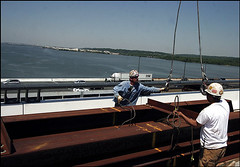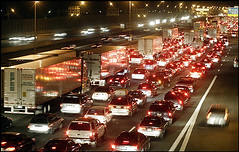Our society is constructed around driving
 An oil pumping unit is silhouetted against an orange sky as it pulls crude oil out of the ground near Virgil, Kan. Friday, April, 21, 2006. Oil prices rose to record highs Friday, topping $75 per barrel. (AP Photo/Charlie Riedel)
An oil pumping unit is silhouetted against an orange sky as it pulls crude oil out of the ground near Virgil, Kan. Friday, April, 21, 2006. Oil prices rose to record highs Friday, topping $75 per barrel. (AP Photo/Charlie Riedel)The title is a sentence from Marc Fisher's column in today's Post, "Wallet-Numbing Prices May Prime Pump for Gas Tax Increase." Unfortunately, I think he misses the point, judging by what he writes in the rest of the paragraph:
You could triple the price again, and we'd buck and scream, and then most of us would find a way to get the money. What drives our driving is convenience. It's just that much easier to get in the car than it is to find two buses and a train to get to work.
The reality is that our society is constructed around decentralized deconcentrated land use and development patterns. And the automobile and driving is the way that one gets around in this environment.
 Construction crews get the new Woodrow Wilson Bridge ready for an elaborate opening ceremony next Thursday. Photo Credit: By Jahi Chikwendiu -- The Washington Post Photo
Construction crews get the new Woodrow Wilson Bridge ready for an elaborate opening ceremony next Thursday. Photo Credit: By Jahi Chikwendiu -- The Washington Post PhotoCompact development is the cure--providing efficient mobility options other than automobile-dependence, coordinated development that makes getting between home, work, school, shopping, and other activities far more efficient and less dependent on gasoline.
Besides the pandering in Congress and other places, the other thing that really troubles me about all what I have been reading about the increased price of oil/gasoline, is that the real question, "why is it that the United States consumes so much gasoline?"--25% of the world's daily consumption--isn't being asked.
The second "real" question is "what is it that the gasoline is used for?" The answer is that 65% is used for daily transportation.
The next question would be something like, "what is it about our land use and development paradigm that requires the consumption of so much gasoline?"
Hydrogen or switchgrass or other forms of energy or feedstock are merely grasping onto "technology" in a way that maintains current development patterns.
Perhaps and most likely, these development patterns aren't sustainable.
It should be no surprise that the rise in the price of gasoline hasn't changed overall consumption that much. In a year's time, people aren't able to change where they live or where they work, in order to better balance transportation requirements. They'll grumble, but they are locked in, at least for awhile. People who have transit options already might switch, but many people live in places that aren't well-served by transit, or where transit connections to their place of employment aren't that efficient.
As long as people send e-campaigns around the Internet to boycott one of the big bad oil companies to communicate to "them" that they are "nasty" organizations for raising the price of gasoline for "no good reason" (cf. the field of economics and the discussion of "supply and demand") the fundamental questions aren't going to be addressed.
Alas, Marc Fisher's column doesn't push the necessary discussion forward.
 Rich Lipski, The Washington Post. Viewed from the Springfield mixing bowl area, traffic inches south on Interstate 95, April 13th, 2006, in the direction of a multi-vehicle crash.
Rich Lipski, The Washington Post. Viewed from the Springfield mixing bowl area, traffic inches south on Interstate 95, April 13th, 2006, in the direction of a multi-vehicle crash.Index Keywords: car-culture



0 Comments:
Post a Comment
<< Home